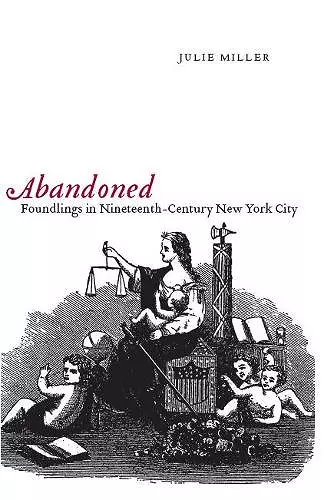Abandoned
Foundlings in Nineteenth-Century New York City
Format:Paperback
Publisher:New York University Press
Published:1st Apr '08
Currently unavailable, and unfortunately no date known when it will be back

Offers a fascinating history of a once devastating social problem
Two interesting items:
The author's article in New York Archives
A letter regarding foundlings in The Riverdale Press
In the nineteenth century, foundlings—children abandoned by their desperately poor, typically unmarried mothers, usually shortly after birth—were commonplace in European society. There were asylums in every major city to house abandoned babies, and writers made them the heroes of their fiction, most notably Charles Dickens's Oliver Twist. In American cities before the Civil War the situation was different, with foundlings relegated to the poorhouse instead of institutions designed specifically for their care. By the eve of the Civil War, New York City in particular had an epidemic of foundlings on its hands due to the rapid and often interlinked phenomena of urban development, population growth, immigration, and mass poverty. Only then did the city's leaders begin to worry about the welfare and future of its abandoned children.
In Abandoned, Julie Miller offers a fascinating, frustrating, and often heartbreaking history of a once devastating, now forgotten social problem that wracked America's biggest metropolis, New York City. Filled with anecdotes and personal stories, Miller traces the shift in attitudes toward foundlings from ignorance, apathy, and sometimes pity for the children and their mothers to that of recognition of the problem as a sign of urban moral decline and in need of systematic intervention. Assistance came from public officials and religious reformers who constructed four institutions: the Nursery and Child's Hospital's foundling asylum, the New York Infant Asylum, the New York Foundling Asylum, and the public Infant Hospital, located on Randall's Island in the East River.
Ultimately, the foundling asylums were unable to significantly improve children’s lives, and by the early twentieth century, three out of the four foundling asylums had closed, as adoption took the place of abandonment and foster care took the place of institutions. Today the word foundling has been largely forgotten. Fortunately, Abandoned rescues its history from obscurity.
Abandoned is a smart, well-written book that makes wonderful use of extensive primary sources and successfully engages the reader. * New York History *
Julie Miller's deeply researched book on foundlings in nineteenth-century New York City fills a long-standing lacunae in the history of dependent children. * Journal of American History *
Highly recommended. * Choice *
From Moses to Harry Potter, the stories of abandoned children have always intrigued us, even when we lack humane responses to their situation. In this well-written and insightful book, Miller provides access to the experience of children in the past, as well as the complex world of public and private charities, municipal reformers, clergy, and physicians who interacted with them in nineteenth-century New York City -- Joan Jacobs Brumberg,author of Kansas Charley: The Story of a 19th-Century Boy Murderer
Meticulously researched, compellingly written, Abandoned is a highly original study of an inexplicably understudied topic: child abandonment in the nineteenth-century American city. This important book provides a powerful corrective to excessively romanticized views of childhood in the past. -- Steven Mintz,author of Huck's Raft: A History of American Childhood
ISBN: 9780814757260
Dimensions: unknown
Weight: 454g
336 pages